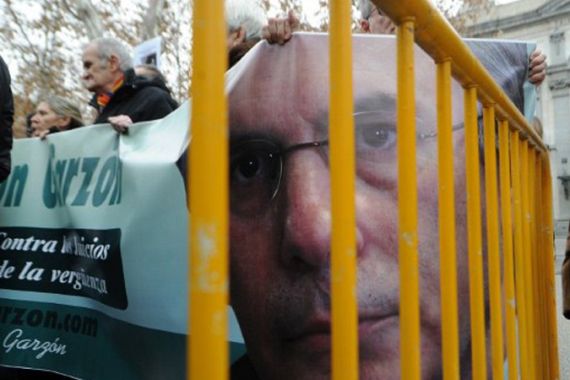Spain’s human rights judge goes on trial
Baltasar Garzon, famed for inquiries into abuses in Spain and Latin America, faces charges of abusing judicial powers.

One of Spain’s best known judges has gone on trial in the country’s supreme court on charges of abusing judicial powers.
Baltasar Garzon, renowned for his investigations into human rights abuses in Spain and Latin America, appeared before the Madrid court on Tuesday to face the first of three trials, which his supporters say are politically motivated.
In the first trial, Garzon is accused of illegally authorising police to record the conversations of lawyers with their clients.
The case was brought by two businessmen awaiting trial for allegedly bribing members of the People’s Party (PP), which won a landslide election victory in November.
In the second trial, which is set to begin next week, Garzon is charged with overstepping the bounds of his judicial powers by ordering an investigation into abuses during Spain’s civil war in the 1930s.
In the third case, Garzon faces allegations he dropped an investigation into the head of Spain’s biggest bank, Santander, after receiving payments for a course sponsored by the bank in New York.
Garzon has dismissed the accusations and Spain’s public prosecutor has recommended the judge’s acquittal on all the charges.
Human rights groups and many Spanish supporters of Garzon view the accusations as attacks on Garzon for his investigation, launched in 2008, into alleged crimes against humanity committed by Spain’s nationalist government during the 1936-39 civil war.
The inquiry made him many enemies from Spain’s political elite.
‘Massive figure’
Al Jazeera’s Jonah Hull, reporting from outside Madrid’s supreme court, said a demonstration in support of Garzon was taking place outside the court.
“He is a massive figure in Spain. He has been described as the most polarising figure in the country. He has a lot of public support and is the darling of human rights groups.”
If Garzon were convicted in any of the cases, he could be banned from serving as a judge for up to 20 years, in what would be a career-ending blow for the 55-year-old. But he will not face jail time on any of the charges.
Garzon is also famous for leading an investigation into death squads organised by the socialist government in the 1980s to target Basque separatist fighters, an inquiry credited with helping the centre-right defeat the left in 1996 elections.
Garzon is also charged with violating an amnesty law by ordering an investigation into the killing of tens of thousands of civilians during the dictatorship of General Francisco Franco, who died in 1975.
A number of international lawyers, human rights organisations and left-wing artists, including Spanish film director Pedro Almodovar, have come out in support of Garzon.
“What bitter irony that Garzon is being prosecuted for trying to apply at home the same principles he so successfully promoted internationally,” said Reed Brody, counsellor and spokesman for Human Rights Watch.
“Absent clear and compelling circumstances, prosecuting a judge for his judicial acts undermines judicial independence.”
Garzon is expected to give evidence in his defence in the first day of the trial. Garzon’s lawyer will again ask for two of the judges hearing the case to be replaced, claiming they are not impartial.
Garzon’s attempt to extradite former Chilean dictator Augusto Pinochet from Britain in 1998 to face charges of human rights abuses after the dictator’s 1973 coup in Chile set a precedent for the principle that crimes against humanity can be investigated anywhere.